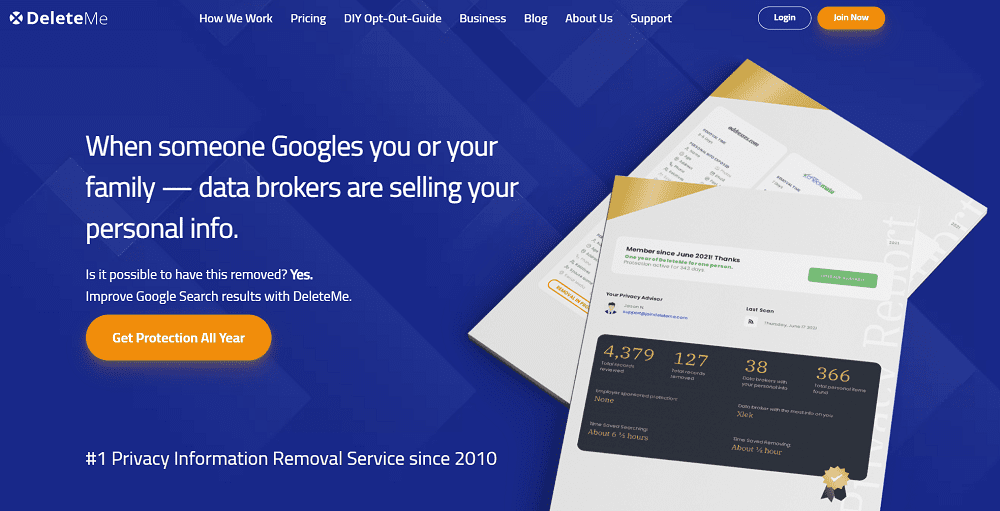Want to delete yourself from the internet to Protect your privacy online? This article will give you details about how data brokers collect information and simple methods to Remove Your Personal Information From The Internet.
We all know somebody whose personal information has ended up in the wrong hands: they had fraudulent charges on their credit card, or they have been notified of their information being involved in a large-scale data breach, or worst of all: their identity was stolen.
If you’re worried that your personal information might get stolen, it’s best practice to remove personal information from Google search results altogether.
How to Remove Your Personal Information From The Internet
Video Tutorial
We provided this article in the form of a Video Tutorial for our reader’s convenience. If you are interested in reading, skip the video for now and watch it after the completion of reading this article.
While you can purchase many professional services to help manage your online footprint, many free ways help you remove your information from the internet.
STEP-1: Erase Online Accounts

Most of the websites that we use regularly, like Amazon or Netflix, also store a lot of personal information — your full name, email, maybe even your date of birth, your address, and more.
Deleting accounts that you no longer use is a great way to start erasing yourself from the internet. Each website and app has its own set of instructions for deleting an account, so this might take some time.
STEP-2: Find the Source
When someone searches for you on Google and finds your personal information, the website that they show is the source of your information — not Google itself. For example, if you’ve posted content on a blog or forum, the original website “hosts” that information.
The best way to remove yourself from these kinds of searches is to go back to the original “host” site and delete your account or content from there.
STEP-3: Remove yourself from data broker websites
Data brokers like Whitepages, BeenVerified, and Intelius are constantly crawling the web for your personal information, and then collecting and organizing it into personal profiles about you. They post this on their websites, making your information publicly available for anyone to find. They collect data about every move you make online, put together a profile, and sell it to anyone who will buy it(at a pretty low cost).
What Information do Data brokers collect?
You can probably guess that they have your basic information from your online accounts and shopping: your name, age, address, and so on. But did you know that they also collect information from public records, such as voter registration, criminal records, or vehicle registration?

Data brokers are very interested in “life-event triggers,” including marriage, divorce, births, deaths, and even buying a home. They also collect salary information, paystub data, and charitable donations. This information is then organized, collated, and sold to companies and marketing agencies to serve you targeted (sometimes creepily-targeted) ads.
According to the Federal Trade Commission, just one data broker has information on 1.4 billion consumer transactions, totaling over 700 billion data points and 3,000 data segments for nearly every American consumer.
How do data brokers use your Data?
For example, a furniture company could buy a list of new homeowners, to target their home mail, email addresses, and online ads with advertisements for their company. Companies stand to make a lot of money from targeted advertising and will pay data brokers a lot of money for their data. By one estimate, a data brokerage division of a company adds more than 290,000 records on new homeowners each month.
Data brokers aren’t just collecting your information. They’re using it to build a digital profile of you, make inferences about your preferences, and place you into consumer groups. According to the FTC, these groups could be things like “dog owners” or “fantasy novel readers,” or more sensitive categories such as “interested in diabetes” or “high school level education.”
Not only does this feel like an invasion of privacy, but an FTC report has argued that being placed in these categories can put you at risk. The report reveals, “While data brokers have a data category for ‘Diabetes Interest’ that a manufacturer of sugar-free products could use to offer product discounts, an insurance company could use that same category to classify a consumer as higher risk.”
How do data brokers collect information?
The FTC argues, “Broker practices have grown dramatically in breadth and depth, as data brokers can collect information from more sources, including consumers’ online activities; analyze it through new and emerging algorithms and business models; and store the information indefinitely due to dwindling storage costs. Despite the Commission’s recommendations, lack of transparency and choice remain significant issues in this industry.”
How to protect privacy online from data brokers
You could go through each website yourself, and send individual requests to each one to remove your information. This can be an intimidating task: there are countless data broker sites, and new ones are always appearing. Each data broker has its opt-out process, and might even make you a new listing shortly after you’ve removed one.
Another option is to use DeleteMe. DeleteMe is a hands-free subscription service that removes your personal information from the leading data broker websites online. DeleteMe’s privacy specialists are experts in removal from Whitepages as well as all other major data broker websites.
About DeleteMe

DeleteMe empowers individuals to take back control over their personal information; and how it is accessed, shared, and sold online. The subscription service removes details like names, addresses, and phone numbers from websites such as Whitepages, Spokeo, and Intelius to help clients remove personal information from Google.
Highlights of DeleteMe
- Easy-to-use
- Top service to remove Personal Information
- Safe and Secure
Pricing
DeleteMe plans are available according to how many people and How many years. The prices are listed below.
- 1 user
- 1 Year – $10.75/month Billed annually ($129/year)
- 2 Years – $8.71/month Billed biennially ($209/ 2 Years)
- 2 Users
- 1 Year – $19.08/month Billed annually ($229/year)
- 2 Years – $14.54/month Billed biennially ($349.9/ 2 Years)
- 3 Users
- 1 Year – $25.00/month Billed annually ($299/Year)
- 2 Years – $17.50/month Billed biennially ($419/2 Years)
- 4 Users
- 1 Year – $27.42/month Billed annually ($329/year)
- 2 Years – $20.79/month Billed biennially ($499/2 Years)
- 5 Users
- 1 Year – $34.33/month Billed annually ($412/Year)
- 2 Years – $26.04/month Billed biennially ($625/2 Years)
Offer: Our readers get a special 20% discount on all DeleteMe subscriptions using the coupon code VWANT20.
- READ MORE – Top 10 VPN services which can encrypt your online data
- VPS Vs VPN: What is the Difference?
I hope this tutorial helped you to know about the 3 Steps To Remove Your Personal Information From the Internet. If you want to say anything, let us know through the comment sections. If you like this article, please share it and follow WhatVwant on Facebook, Twitter, and YouTube for more Technical tips.
How To Remove Your Personal Information From the Internet – FAQs
Is DeleteMe any good?
DeleteMe has a consumer rating of 4.71 stars from 777 reviews indicating that most customers are generally satisfied with their purchases.
Is DeleteMe worth the money?
Overall, the pros outweigh the cons – at least for me – and I’m satisfied with my experience. I value my time as much as I value my privacy so for me, it was worth the expense.
Which is better OneRep or DeleteMe?
The biggest difference between OneRep and DeleteMe is automation – DeleteMe employs real people to put users out of people’s search sites by the head. OneRep, on the contrary, automates the opt-out process, which comes with a few advantages.
How does DeleteMe.com work?
DeleteMe removes your personal information like name, address, age, phone number, email address, and photos of your home by removing it from the source.
What happens if your phone number is found on the dark web?
Criminals can use this information in a variety of ways, such as to impersonate you or create a fake identity using your Social Security Number. They may even make a driver’s license or medical insurance card using your information and then use the documents if they’re arrested or want to get a medical procedure.
